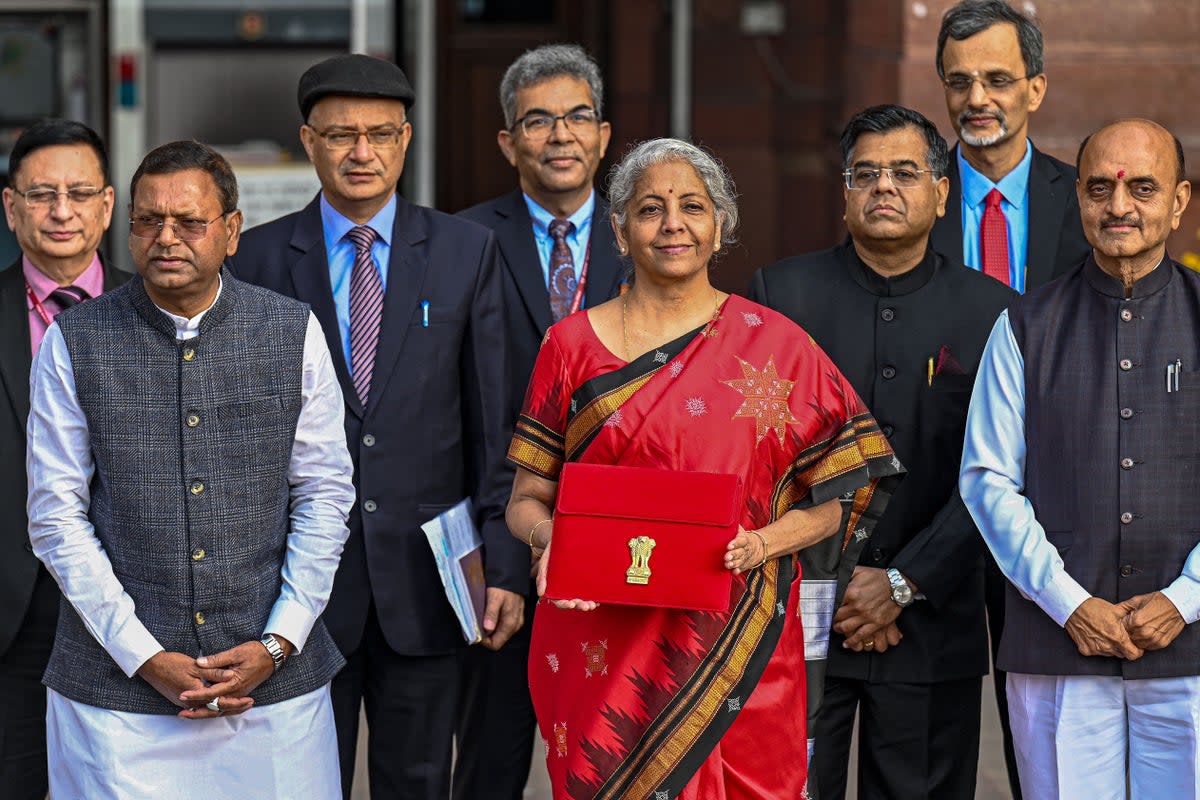India budget: Modi promises jobs and tax giveaways in final fiscal statement before national elections

Prime minister Narendra Modi’s government announced its federal budget for the fiscal year 2023-24 for India with the aim of bringing down fiscal deficit and unveiling one of the country’s biggest spikes in capital spending.
Federal finance minister Nirmala Sitharaman unveiled a slew of measures from the Indian parliament in capital Delhi as markets opened in the green on Wednesday.
The measures include more funds for India’s booming startup ecosystem, a further raise in the income tax exemption ceiling and more financial backing for the agricultural sector, civil infrastructure projects, rural housing schemes and the promise of further job creation in the new financial year starting April 2023.
The moves, that also include financial boosts for states, government welfare schemes and development projects, is the Modi administration’s eighth federal budget.
The budget is also the final one that presented before key state elections this year along with the national election a year later and is an attempt to woo the Indian middle class, a significant vote bank for Mr Modi’s right-wing Bharatiya Janata Party (BJP).
“After a subdued period of the pandemic, private investments are growing again,” Ms Sitharaman said in parliament to the more than 500 lawmakers gathered there.
“The budget makes the need once again to ramp up the virtuous cycle of investment and job creation. Capital investment is being increased steeply for the third year in a row by 33 per cent to â¹10 trillion,” Ms Sitharaman said.
The finance minister said that in the 75th year of India’s Independence, “the world has recognised the Indian Economy as a ‘bright star’”.
She said the country’s economic growth was “estimated at 7 per cent [for the upcoming financial year], which is the highest among all major economies”. Ms Sitharaman added this was despite the massive global downtturn caused by Covid-19 and the Ukraine invasion.
Among of the other biggest announcements, the finance minister said that the government was looking at the gross borrowing of â¹15.43 trillion (£152bn) in the upcoming financial year from the markets to finance the national expenditure requirement.
As Ms Sitharaman announced a major jump in capital spending, BJP lawmakers thumped their desks in approval.
She added that India will renounce â¹350bn (£3.4bn) in revenue by pushing the ceiling on income tax exemption and cutting rates. From the new financial year, the government will raise the tax paying exemption for individuals making up to â¹700,000 (£6,934) per annum, compared to â¹500,000 (£4,953).
Just a day earlier, the annual pre-budget survey assessing the country’s financial health showed the Indian economy is staring at a slowdown with the gross domestic product (GDP) consumption expected to be 6.5 per cent higher than the current fiscal year.
This is the slowest growth pace for the Indian economy in the past three years, according to the country’s own economic survey. The forecast is pegged higher than the project given by the International Monetary Fund, which has logged it at 6.1 per cent for 2023-24.
The country saw a GDP growth of seven per cent in the current fiscal year and 8.7 per cent for the year 2021-22.
Mr Modi is looking to clinch a third term in 2024, the road to which is punctuated by key elections in big states this year.
To clinch the political support of the poor, the budget has offered subsidies to poor households, while wooing investors by lowering tax rates and announcing labour reforms.
Ms Sitharaman, India’s finance minister for nearly four years now, said the new budget’s aim was to have strong public finances and a robust financial sector for the benefit of all sections.
The boost in capital spending includes roads and energy. For India’s transition to clean energy, â¹350bn (£3.4bn) was announced by Ms Sitharaman.
India has been under global scrutiny for its use of coal and faces a global push to focus on green hydrogen and other cleaner fuels to meet climate goals, including to achieve net-zero by 2070.
Ms Sitharaman’s budget speech was briefly interrupted by opposition members who chanted “Adani, Adani”.
The leaders were referring to tycoon Gautam Adani, whose wealth and company stock faced a major rout after an American financial research firm accused his conglomerate of “a brazen stock manipulation and accounting fraud scheme”.
Mr Adani was the richest man globally until a few days back and has often faced accusations that he is helped because of his proximity to Mr Modi, both of whom share the same home state.
The budget announcement, however, propelled the Indian market to a high and was in the green for several shareholders.
The budget will now be debated by the lower and upper houses of parliament before it can be enacted – a smooth sailing for the BJP as Mr Modi’s party has a dominating majority in both houses.

 Yahoo Lifestyle
Yahoo Lifestyle 
